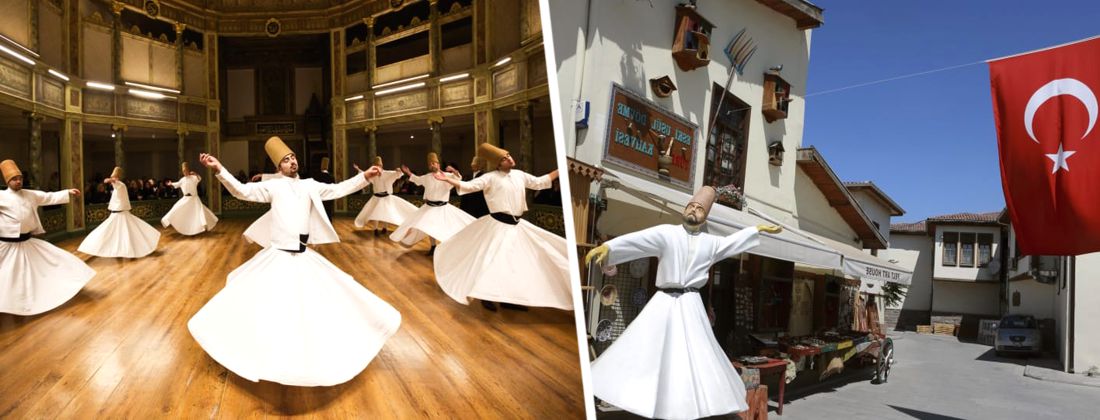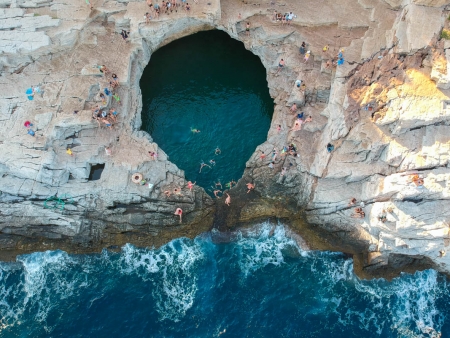
The annual ceremony is dedicated to the great Sufi Rumi in Turkey
 The annual ceremony is dedicated to the great Sufi Rumi in Turkey
The annual ceremony is dedicated to the great Sufi Rumi in Turkey
In Konya the ceremony of the “Şeb-i Arûs” dedicated 747 anniversary of the death of Mevlana.
His work of Jelaleddin Mevlana and Rumi, figuratively speaking, opened her arms to all people, regardless of their religion, sect and race and showed the way of love for one’s neighbor.
747-th anniversary of the death of the philosopher was marked by a ceremony “Şeb-i Arus”. Because of the pandemic, this year the first ceremony was held on 7 December in Konya, where Rumi spent most of his life, and passed without visitors. The second ceremony, again with no participants, will be held on December 17.
The poet, a Sufi Mevlana Jelaleddin and Rumi, who lived in the 13th century and are known worldwide under the name “Rumi” is considered the greatest philosopher of Sufism. The Mevlana love and respect all religion, its poetry and religious works applicable to all of humanity. Although Mevlana was identified with many titles, such as the Muslim poet, jurist, Islamic scholar, theologian and Sufi mystic, he was primarily a philosopher. Presenting the order of life, he believed in “being,” and said that all the rest consists of images.
Mevlana, whose work is open to all, regardless of race and religion, became a symbol of equality in the world in all senses. Every year visitors from all over the world, followers of the philosophy of Mevlana, attend the ceremony held in Konya dedicated to the memory of Mevlana, Celaleddin and Rumi who spoke to people about truth and love, spreading a humanistic worldview for all of humanity.
Konya, whose history dates back to 7000 BC, one of the largest cities in the Central Anatolia region in Turkey, was “the cradle of civilizations and religions”, here for centuries lived many civilizations. The city is known not only Rumi but also a rich culture that combines all the historical heritage of these civilizations.
Ceremony “Şeb-i Aruz“, which has become an annual ritual in Turkey.
Since 1937, every anniversary of the death of Jalal al-DIN Rumi, in Konya held a memorial ceremony for “Şeb-i Aruz” (Night of reunion with God). This year the ceremony “Şeb-i Aruz” will be held with the support of Ministry of culture and tourism of Turkey in the 83rd time. This year marks the 747 years since the death of the world famous Sufi mystic, poet and scholar. The first ceremony this year was held on 7 December and, in connection with the pandemic passed without visitors. The second ceremony will be held on 17 December, again with no participants. The ceremony will be streamed live on digital platforms and on television.
History WeMS–and Tabrizi and Rumi
The doctrine of the Sufi poet and Islamic scholar Rumi had a great influence on the mystical thought and literature throughout the world. According to the stories, Mevlana, who is always loved in the Islamic world, was very sad when she lost her teacher Shams and Tabrizi, together with whom they opened the depths of spirituality. This loss responded great pain in his soul. He renounced all worldly things and wrote “Mesnevi”, a poem consisting of 25 thousand couplets, which is considered the most perfect Sufi poem in the world. For Mevlana true love is the love of God; and death to him was the day when he will meet God. That is why the anniversary of the death of the philosopher, December 17, is not considered a day of mourning and holiday. The name of the ceremony, Seb-i Arus, which is held annually on 17 December, means “the night of the reunion or the wedding night”.
Which means Şeb-i Arus?
Russian equivalent of the Seb-i Arus – the “wedding night”. Wedding night known order of Mevlevi, as the night of the death of Mevlana, Celaleddin and Rumi. Jelaleddin Mevlana and Rumi called his death the “wedding night” because he thought that this night – the night of the reunion with his Lord, whom he felt true love. Mevlana interpreterpath death as a “return to God” as the return of man to his original source of the divine essence. For him death is not the disappearance of the body, and the way to God. The ceremony, held in the preceding December 17 week, the anniversary of the death of Rumi, became known as the International commemoration ceremonies for the anniversary of the Reunification, also popularly known as “Seb-i Arus”. UNESCO has declared 2007 – the year of the 800th anniversary of Mevlana – the International year of Mevlana.
Life Mevlanas Jelaleddin and Rumi
Rumi describes his life with a simple phrase: “I was raw, I was burned, I got burned.” His real name is Mohammed Jelaleddin. He later received the names Rimi (scientist) and Rumi. He was born on 30 September 1207 in Balkh in present day Afghanistan. His family left Balkh in 1212 and went to Mecca for Hajj, passing through Baghdad, Nishapur and Kufa. Later, while traveling through Damascus and Aleppo in 1222 the family settled in Karaman (Larende).
Rumi’s father was a prominent theologian, jurist and mystic. In 1228 he became head of the madrasah at the invitation of the Seljuk Sultan Alaeddin Keykubat and moved with his family from Karaman to Konya, capital of Seljuk state. After his father’s death Rumi took over the role of the teacher of Islam, and for many years gave lectures and sermons. From time to time in his lectures and talks was attended by representatives of different religions.
Jelaleddin Mevlana and Rumi died in Konya at the age of 66 on 17 December 1273. The body of Rumi was buried beside the body of his father, and over his place of burial was erected a magnificent temple Yesil the Tomb (Kubba-Khadra and Green Mausoleum). Attached to the Rumi mausoleum, the former Dervish Seminary now serves as a Museum – a Museum of Rumi, where the manuscripts of the works of Rumi and various artifacts related to the mysticism. After the death of Rumi, his followers founded the Mevlevi Order, also known as the Order of the Whirling Dervishes, famous for its Sufi dance and the ceremony of SEMA. Rumi’s works are considered the pinnacle of mystical art that goes beyond religious, cultural and ethnic boundaries.
The Legacy Of Rumi
- Recordings of Rumi poems have been included in the list of top 20 songs of Billboard in the United States.
- Mevlana became the “best selling poet of America,” and his poems for decades been one of the most widely read at weddings. Compare it with Shakespeare in his immense creativity and with Saint Francis of Assisi, his spiritual wisdom.
- A selection of American author Deepak Chopra, translations of Fereydoon Kia the love poems of Rumi was voiced by such stars of Hollywood, like Madonna, Goldie hawn, Philip glass and demi Moore.
- The picture Mevlana Mausoleum and was included in the banknote 5000 Turkish liras, which were in circulation from 1981 to 1994.
- In Lucknow, capital of Uttar Pradesh, in Northern India, is the architectural structure, known as Rumi Gate, built in honour of Mevlana.

















Add Comment